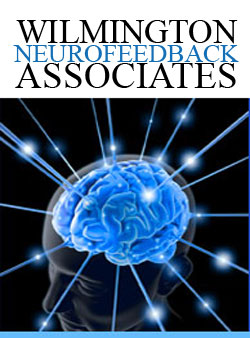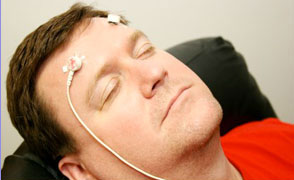Wilmington Neurofeedback Associates-Counseling

Please call for an appointment. There is no charge for the initial consultation.
What Is Neurofeedback?
Neurofeedback is like a mirror for the brain. When the brain is not organizing its activity to best meet the demands placed on it, physical and/or emotional symptoms often result. Neurofeedback is a method of training the brain to change its inefficient activity to more appropriate, productive patterns. It utilizes the electroencephalogram, or EEG, which detects brainwave activity when small electrodes are placed on the scalp. Brain activity is shaped toward more desirable performance by visual and auditory feedback which the client receives as they observes graphic displays or plays games on a computer. The particular brainwaves which are targeted and the locations on the scalp where electrodes are placed are specific to the problem(s) being addressed, and to the individual.
As the brain produces the desired activity, it is rewarded with visual and auditory feedback, and when it fails to do so, it receives the negative consequence of a reduction in feedback. With continued practice, the brain learns to perform in the more rewarding, desirable manner.
Virtually every brain can be trained to function better. Numerous sports figures are utilizing Neurofeedback for peak performance. Corporations on the cutting edge have adopted this technology with their personnel.
In the medical and mental health arenas, common manifestations of an inefficient brain are: post-traumatic stress disorder, reactive attachment disorder, addictions, alcoholism, attention deficits, learning problems, behavior problems, mood disorders, seizures, sleep problems, headaches, migraines, traumatic brain injury, and autistic spectrum disorders. Consequently Neurofeedback can be useful in diminishing the negative consequences of these difficulties.
 Meet Dr. Jonathan Crook
Meet Dr. Jonathan Crook
Dr. Crook graduated from Gettysburg College with a B.A. in 1972. He received his Ph.D. in Education from George Mason University in 2004. He earned his Mater’s degree in Counseling from George Mason University in 1979.
Dr. Crook has been in private practice since receiving his Master’s degree in 1979.
“I possess a vast clinical experience with a wide variety of people who have asked for my help. I have been clinically supervised in assessment, counseling and neurofeedback for many years. By participating in continuing education, I keep up to date with the changes in our understanding of both the mind and the brain.”
Dr. Crook is a Licensed Professional Counselor in the State of North Carolina. He has been been counseling children, adolescents, adults, families, couples, and groups for a broad range of personal and educational issues for over 33 years.
“I utilize neurofeedback in my practice, often in conjunction with other counseling interventions. I may also use counseling and educational assessments, such as rating scales and standardized instruments. I sometimes incorporate the use of cognitive-behavioral interventions, hypnosis, and family interventions in my practice.”
 We offer the following comprehensive services:
We offer the following comprehensive services:
- Initial Assesment
Dr. Crook will meet with an individual or couple that is interested in exploring how counseling, psychotherapy, neurofeedback or other services might benefit them. Regular hourly rates apply during this initial Assesment Session. - Counseling Services
Behavior is a function of the person and their environment. When behavioral change is sought, these are the two leverage points. - Neurofeedback
Neurofeedback is a kind of unlearning which makes behavioral change easier. For a more comprehensive explanation of neurofeedback and its usefulness, visit www.eeginfo.com - Cognitive-Behavioral Counseling
Cognitive-behavioral counseling helps an individual shape their thinking and their behavior. It can be used in conjunction with neurofeedback or on its own depending upon the presenting problem. - Couples and Family Counseling
Couples counseling and family counseling are useful when the stress of the home environment contributes to behavioral and emotional distress. - Hypnosis
Clinical hypnosis is useful for some behavioral changes. It is particularly useful for quitting smoking and as part of an integrated program for weight control. Dr. Crook has practiced clinical hypnosis for more than 25 years.








